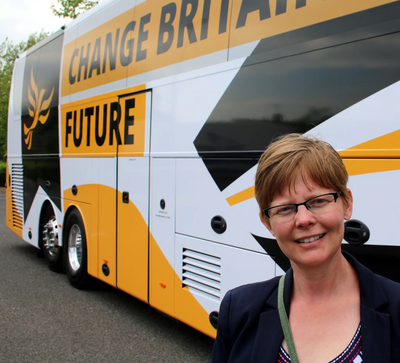Dr Rebecca Trimnell calls for 'People's Budget'

The Liberal Democrats are calling for a new People's Budget to heal the divided country - as it becomes clear there will not be a "Brexit dividend".
Under the party's proposals there would be a three-step Budget plan, which involves stopping Brexit, fairer taxes and funding public services.
Chancellor Philip Hammond may have claimed that "the era of austerity is coming to an end" but austerity cannot be ended without difficult decisions involving an increase in taxation, according to Gloucester Lib Dem Parliamentary candidate Dr Rebecca Trimnell.
Schools, the NHS and the police are all struggling. Meanwhile, the botched introduction of Universal Credit with deep cuts in funding is causing great hardship.
The Office for Budget Responsibility estimates that uncertainty caused by Brexit has already weakened the public finances to the tune of £15 billion annually.
A no-deal Brexit with which Prime Minister Theresa May and her Government are flirting would be far worse still.
"A People's Vote would save our country from Brexit and freed from the costs of Brexit, we can come together to reunite the country behind a recovery plan for the economy and public services," said Dr Trimnell.
"If we stop Brexit, the public finances could be lifted by £15 billion annually through increased wages, growth and business investment and the £3 billion set aside for 'Brexit contingencies' so far could be spent on public services."
The Lib Dem People's Budget would:
• Secure the future of our NHS, focusing on social care and mental health with an extra £6 billion per year, funded through a penny in the pound on income tax.
• Improve living standards for 9.6 million parents and children, by reversing George Osborne's cuts to the "work allowance" under Universal Credit, costing £3 billion.
• Invest an extra £2.8 billion in to the schools budget, by reversing the Government's proposed cuts to school funding.
• Scrap business rates - replacing them with a tax on land values known as the Commercial Landowner Levy. The reformed system would increase incentives to invest in new equipment and renovations, and cut taxes for businesses in nine out of 10 English local authorities.
• Reverse Conservative cuts to Corporations Tax - still leaving the UK with the lowest rate of corporation tax in the G7.
• Work with the EU to crack down on tax avoidance by the tech titans and working to secure agreement on taxing multi-nationals' profits.
• Reform wealth taxation - bringing capital gains and dividend taxes into line with income taxes, removing the most generous pension tax reliefs from the highest earners, and replacing the inheritance tax system with a fairer lifetime transfer tax.
The Chancellor announced that the personal allowance will rise to £12,500 and the higher rate threshold to £50,000 in April 2019, worth £130 a year for a typical base rate taxpayer.
Dr Trimnell added: "I welcome the rise in personal allowance and minimum wage, but until we know the financial consequence of Brexit it is difficult to speculate on the benefits as these could quite easily be outweighed by a bad deal or no deal."
